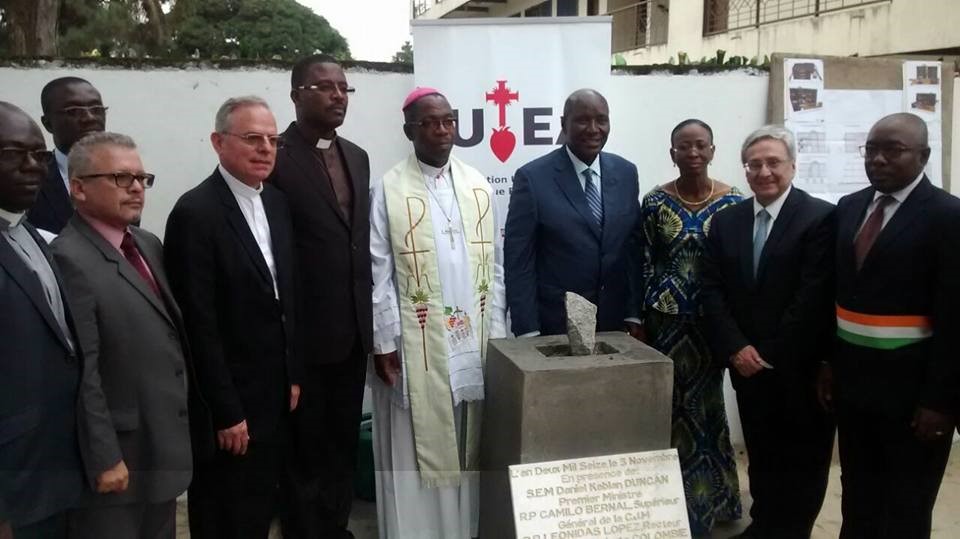
Groundbreaking ceremony for the beginning of the IUTEA’s Building construction, with governmental and religious authorities of Ivory Coast in attendance (2016).
Photo Credit: UNIMINUTO
Summary
The Minuto de Dios University (UNIMINUTO), is a higher education institution with a presence of more than 27 years in Colombia during which time it has focused on providing opportunities for access to higher education to the country’s population at the base of the economic pyramid. Through its international experiences, UNIMINUTO participated for 10 years in assisting two higher education institutions with their growth through reinforcement. This experience as well as its international recognition, prepared the UNIMINUTO model to be transferred to other developing countries, this roadmap started with the systematization of the model to become a standard of higher education that can be replicated in similar social and economic environments as in the case of West Africa.
Article
The Minuto de Dios University (UNIMINUTO), is a higher education institution that has had a presence in Colombia for more than 27 years, during which time it has focused on providing opportunities for access to higher education to the country’s population at the base of the economic pyramid. UNIMINUTO is one of the entities that comprise the Organización Minuto de Dios, created by the Eudist priest, Rafael García Herreros, which is dedicated to comprehensive development and overcoming poverty among the Colombian population by focusing on work in different areas of vulnerability such as education, housing, entrepreneurship, employment, among others.
The growth of UNIMINUTO, presently at 120,000 students, has been based on its increased presence throughout the country. The regionalization model has made possible the creation and management of 12 campuses in the main cities, regional centers, and centers of tutoring in smaller areas of the country, where it is possible to access a variety of information with in-person, remote, or virtual methodology.
Due to its focus on vulnerable populations gaining access to higher education, UNIMINUTO was recognized internationally for its inclusive model in 2011 by The International Finance Corporation (IFC), in 2012 by G20, and in 2013 by The Financial Times. These awards highlighted the innovation, impact, sustainability, and replicability of UNIMINUTO’s model.
Based on international recognition, the strategic objective of transferring this experience to other developing countries emerged, the reasoning why is that between 2014 and 2015 the process of systematization of the UNIMINUTO model began, as a work of collective construction, was the institutional tacit knowledge that became explicit knowledge through the “Manual of the Modular System UNIMINUTO.” This material contains all of the experiences through components, variables, modules, and practices, all integrated in the levels of identity, operation, and relationship, to facilitate its gradual and contextualized transference. The process of systematization goes beyond the traditional internationalization of most higher education institutions (HEIs).
For the traditional internationalization process, the institutions have been working with transversal internationalization, incorporating knowledge and technology prospectively in order to take on the challenges of the future. This has been implemented through the learning of at least a second language, through incorporating knowledge in the curriculum and updating bibliographies from other contexts, and also through the academic mobility of teachers and students, for the exchange of experiences and agreements of double academic degrees and/or joints researching projects, among other actions.
While the HEIs have developed an internationalization strategy which in Colombia is measured with the “national and international visibility” in the process of official registration (procedure done at The Ministry of National Education to obtain permission of an offer of an academic program). Alternatively, to obtain the voluntary high-quality accreditation (a procedure done against National Council for Accreditation to obtain the high-quality certification of an academic program or institution).
Some HEIs considered a strategy oriented to the creation of campuses in countries different from their home country. This article presents an export of the experiences of a higher education proposal that has been recognized internationally as a sustainable model, with social impact, that is innovative and replicable, and oriented to the population at the base of the economic pyramid, which contributes to development through education.
UNIMINUTO’s Model
The essence of UNIMINUTO is based on the interweaving of the identities of the Eudist spirituality and the Minuto de Dios work, with a praxis of social inclusion to development, through education and willingness of service. This means that the UNIMINUTO system is established as a structure of identity and knowledge, which aims to be a resource of institutional development in all of its areas (UNIMINUTO, 2015). It is conceived of as a good practice, thanks to its results, as it has proven to be a successful experience, validated, and replicable (Organización de las Naciones Unidas para la Alimentación y la Agricultura- FAO, 2013).
Through these national experiences, over a period of 10 years UNIMINUTO helped to establish two HEIs by supporting their growth and providing reinforcement, as well as securing international recognition for its work. These actions helped to prepare the transfer of the model to other developing countries, the roadmap started with the systematization of the model to become a standard of higher education that is replicable in similar social and economic environments, as is the case in West Africa. Due to institutional relationships, it was possible to connect the Colombian and Ivorian Governments, which were interested in the implementation of solutions to the problems of both experiences in higher education. It is from these circumstances, that the transference of the educational model project to Africa started, orientated in the creation of a university which contributes to the country’s development through higher education.
The transference scheme of knowledge and good practices between countries with equal economic conditions, requires support from the governments involved, private entities, and developed countries for its planning, financing, and execution, along with its execution in south-south and triangular cooperation.
Model Transference to Africa
The experience is conducted between two countries of the global south, the concept is referenced to the developing countries or emerging markets of the southern hemisphere (Africa, Latin America, and Asia), and this does not necessarily propose an inferiority compared with developed countries in North America and Europe. However, it is a call to cooperate between countries with different development levels but with the same needs, related to overcoming poverty distinguished by unmet basic needs. A fundamental characteristic for economic growth, sustainable social development, and overcoming of poverty conditions, is education.
Colombia is a country with a recent history of armed conflict, of which the causes are encysted in social inequity, inadequate public services, corruption, drug trafficking, and the lack of government presence in some regions of the country, especially in the rural areas, where institution is weak or nonexistent. These situations allow the emergence and growth of the guerrillas, paramilitary, and organized crime without political ideals. They are moved exclusively with the purpose of obtaining benefits from illegal businesses related to drugs, arms, mining, and extortion among other criminal offenses that increase forced displacement and widen the poverty gap. In this context, and despite the related difficulties, Colombia has achieved remarkable economic growth, and nowadays is considered an average income country of which it has recently become part of the OCDE, with the commitments of upgrading and improving circumstances around the poverty, security, employment, and quality of education, along with other indicators.
The higher education politics and the quality assurance system of the National Education Ministry (MEN) in Colombia, has allowed for substantial improvement in the quality of HEIs. This is thanks to the processes of Qualified Registration of Programs (certification of minimum quality conditions granted by the Ministry of Health to approve their operation), and the high quality and accreditation of high-quality programs and institutions (certification of high-quality conditions granted by the National Accreditation Council-CNA).
Within the framework of higher education politics, the Minuto de Dios University has improved until it becomes a bigger HEI in Colombia, a leader in learning with innovation, integration of ICT, social impact, and sustainability, with different programs offered and a regionalization process which will allow new regions to participate and contribute to development through education.
After international recognition of the model, emerged the idea of systematizing and transferring this model to other developing countries. UNIMINUTO is an entity created by Catholic priests from the Jesus and Marie Congregation (CJM), also known as Eudists. Father Camilo Bernal, who was for rector general of the UNIMINUTO university system for 14 years, was named Eudist Superior General and located in Rome, where he began his canonical visits to encourage the works of his community brothers around the world.
Through these visits, he arrived at Ivory Coast and Benin, two West African countries where the Eudist presence extended more than 60 years. They were French colonies, so the French province arrived there to do evangelizing, training, and charity work to serve the poorest communities, nowadays the strongest presence is in Abidjan, Ivory Coast, and Cotonou- Benin.
The UNIMINUTO intends to transfer the model to developing countries thanks to its replicability capacity and the identification of needs done by the CJM General House in Rome. On 2013, they concluded with a project formulation the “Transference of UNIMINUTO Model to the Jesus and Marie Congregation in Africa, for the creation of the Institution Universitaire Technologique Eudiste d’Afrique in Ivory Coast,” taking advantage of the Eudist presence in that country and the UNIMINUTO experience in Colombia.
In 2013, initial approaches were concluded, through exploratory missions from Colombia to Ivory Coast and Benin, to get to know the culture and do a pre-feasibility study which gave as the result the determination to initiate the project in Ivory Coast. This was determined by politics, economics, and social conditions, which enabled unprecedented joint work linked to higher education. An international agreement was signed and the formulation of the UNIMINUTO plan in Africa began.
That is how in 2014, with the support of the International Finance Corporation (IFC), and the Cataluña government resources, a feasibility study was made, which as result provided a report, a financial model, and a road map for its implementation. In the same year, two missions to Ivory Coast and one to Colombia took place, which allowed joint work on the evaluation of critical factors for the model transference and training of African Eudist fathers on projects and higher education management, to prepare human talent to lead the project and provide local institutional capacity.
The proposal became a project of south-south cooperation to development through education, due to two countries, Colombia and Ivory Coast, for the first time developing an initiative with these characteristics. Therefore, in 2015 UNIMINUTO approached both governments, receiving initial support from the Presidential Agency of International Cooperation of Colombia to finance the missions as Colombian “knowledge ambassadors” to the world, based on the principle that south-south cooperation is essentially the exchange of knowledge and experiences.
In the same way, through the World Bank a meeting between the rector general of UNIMINUTO at the time and the Prime Minister of Ivory Coast, Daniel Kablan Duncan, was made possible and the doors were opened definitively to move forward on the proposal. A delegation of the Ivorian government traveled to Colombia, to get to know the education system and the UNIMINUTO model, strengthening the alliances of friendship and trust needed to move forward in the creation and establishment of the university in Abidjan, Ivory Coast.
In 2016, began the legal studies related to the creation of an entity that afterwards must be done in face of the Higher Education and Scientific Research Ministry (known by its French acronym MESRS). Cooperative resources were sought for building and equipping the first location of the IUTEA as well as studies to determine the academic offerings needed to initiate its institutional activities. That year, after the project had been presented to several multilateral entities and cooperation agencies, resources were secured from the CEI for the building, equipping, teacher training, and the registration of the first programs of the IUTEA. These financial resources belonged to the “fund for support for third-world countries,” which allocate a percentage of the Italian people’s taxes to aid in overcoming poverty. At the end of 2016, it was completed through a constitution assembly of the nonprofit association IUTEA, whose founding members are UNIMINUTO and CJM-Africa and a groundbreaking was held to begin the building process of its first education center location at the commune of Yopougon in Abidjan.
During 2017, the process to obtain operating permits as a university institution was done, and it was elaborated within the required documents, adapted to the Ivorian normativity, which included the curricular equivalency and design of programs of license and master in the areas of enterprises management, informatics, civil construction, and agroecology. In addition, the first course of training for educators was held where they convened professionals of these subject areas and additionally those related to natural, human, and social sciences to build a database of IUTEA teacher candidates. They received training in pedagogy, didactics, curriculum, and ICT for education-based trainers in UNIMINUTOs Model, of which 47 of 71 people received a certificate. On December 6, 2017, the Higher Education and Scientific Research Minister signed the creation and opening agreement of the IUTEA.
In 2018, began the functioning of the institution. The building was inaugurated in the presence of the MESRS Minister, the Minuto de Dios Organization President, Father Diego Jaramillo, the Rector General of UNIMINUTO, Father Harold Castilla; and the Superior Eudist in Africa, Father Severino LATH. On November 24, the institution opened with 12 classrooms, two information specialists per room, a basic science laboratory, library, cafeteria, teachers’ office, offices, reception area, and male and female restrooms as well as safety stairs. It has capacity for 360 students per day and its academic activities began with 47 students, 17 teachers, three managers, and seven collaborators in the academic and administrative area.
For 2019, the IUTEAs goal is to increase the number of students to enable a financially sustainable operation, and the proposal and implementation of its developed plan to address the value offer which consists of graduating to 20,000 students in 10 years-time. This would be possible through the creation and opening of locations in the main cities of the country, with in-person and e-learning education supported in ICTs. To achieve this goal, work is being done to move forward on south-south cooperation where “all give.” In March a donation of a five-hectare plot in the second largest city of the country, called Bouaké, was made to the IUTEA by the traditional chief of the Gbeke region Nanan KOFFI. The intention is to start the building of a new headquarters for the IUTEA with an agroecological focus, to have complete vocation opportunities in this region.
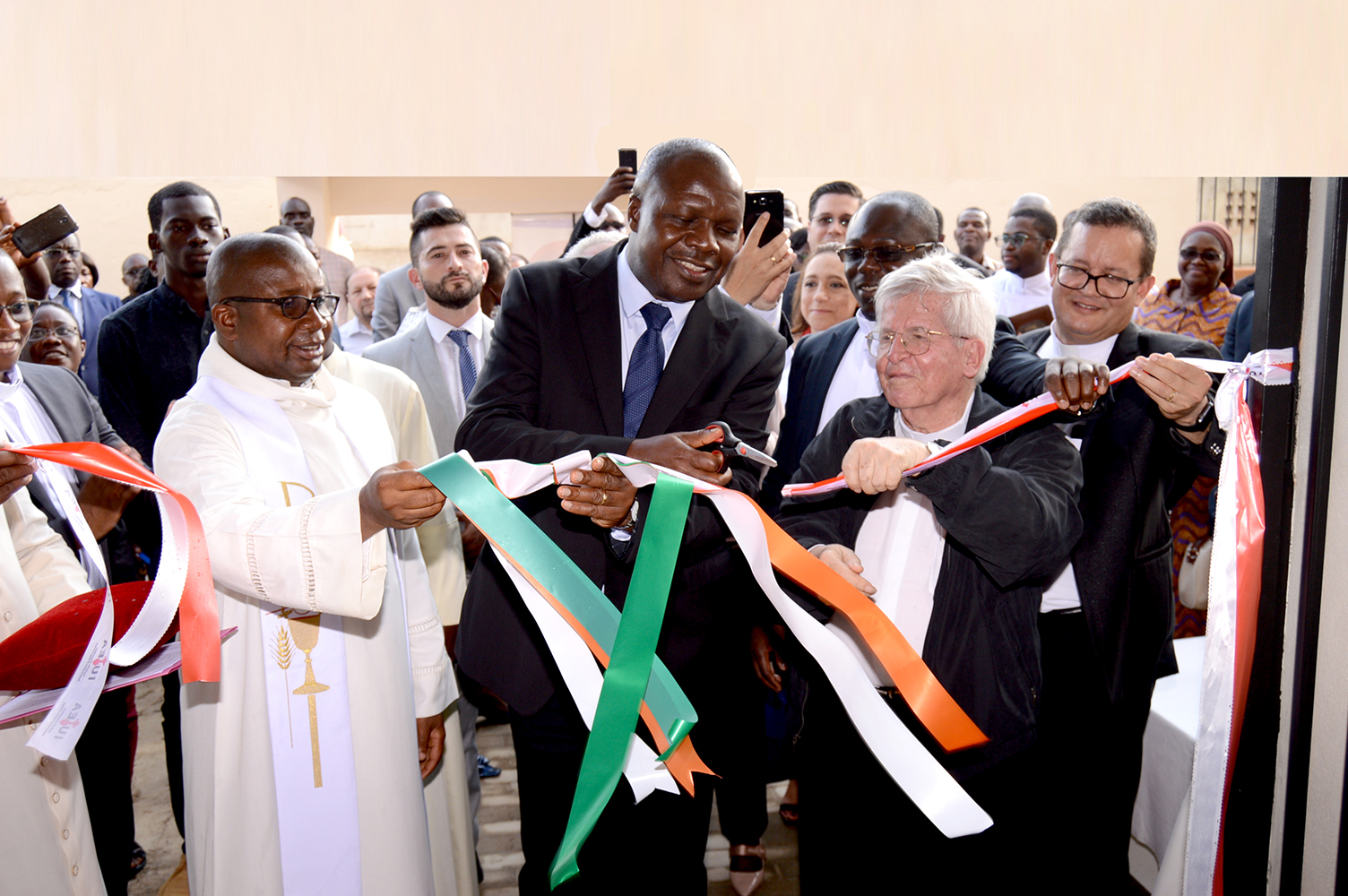
First headquarters of the Institution Universitaire Technologique Eudiste d’Afrique Opening, 2018.
Photo Credit: UNIMINUTO
South-south and Triangular Cooperation
Model Essentials
The process of transference of the UNIMINUTO Model, established for the creation of the Institution Universitaire Technologique Eudiste d’Afrique (the Eudist Technology University of Africa, IUTEA), is based on 27 years of experience of academic activities of teaching, research, and social interaction of the university, orientated to providing access to higher education to populations around the country, mainly those facing vulnerable situations. It provides them with the possibility of improving their living conditions while optimizing activities and available resources, along with the 60 years of experience that comes from having the backing of the Minuto de Dios Organization.
The UNIMINUTO model, given its complexity, is structured in three fundamental layers, which are the layer of identity (its groups have seven components that constitute the institutional drivers and respond to the institutional technological foundation). The operation layer (12 components that make up how we do it -- how to do it), and the relationship layer (three components that respond to different interest groups, users, and beneficiaries) guided by Eudist spirituality and the fundamental principles of the Minuto de Dios Organization.
The model systematization ended with the intellectual property and copyrights of the Manual given by the Ministry of the Interior of Colombia. The Manual of the modular system of UNIMINUTO, collected on 278 pages all of the organizational knowledge, which allows the induction process of the new collaborators and contributes to the institutional quality process in Colombia.
Transference Process -- Social Appropriation
At the moment of doing the transference process of the UNIMINUTO Model to C, it is not only necessary but appropriate that the institution share its knowledge, but it has to Ivory Coast be adapted, integrated, and appropriated by those who receive it in the IUTEA. Therefore, it is necessary for appropriate adaptation to the cultural, political, economic, and social environment, according to the agents and the institution involved. According to Colciencias, the social appropriation of knowledge is understood as “a comprehension process and intervention of the relation between techno-science and society, built from the active participation of the diverse social groups that generate knowledge,” (Departamento Administrativo de Ciencia, Tecnología e Innovación- Colciencias, 2010).
The social appropriation of knowledge and its basis on innovation, because the knowledge is a complex construction, involves the interaction of different social groups (De Greiff, 2010). That is, in the case of the transfer of the model, it is with the application of the model and its appropriation, because the root of the knowledge provided from UNIMINUTO, with the knowledge of the Eudist community of Africa generates a new knowledge, based on both experiences.
This knowledge has to be appropriated by the society, participating actively in this implementation to give it a proper use and generation of this knowledge, that will allow them to improve the practice and experiences of the model transference in developing and empowering the IUTEA impact.
For this project, the appropriation and knowledge transference to Africa, it is necessary to have the active participation of several private and governmental agents, national and international. Initiating an international cooperation process, known this as “a joint action to support the economic and social development of the country, through technology, knowledge, experiences, or resource transference from countries with equal or higher development levels, multilateral organizations, non-governmental organizations, and civil society” (Agencia Presidencial de Cooperación Internacional de Colombia- APC, 2019).
International Cooperation Modalities
There are several well-known international cooperation modalities. According to the needs and projections of the transference process of the model UNIMINUTO, they are related to the south-south cooperation, for its implication on the collaboration between southern countries on political, economic, social, cultural, environmental, and technologic ambits, as Colombia and Ivory Coast are. These are commitments to share knowledge, abilities, experiences, and resources towards the objective achievement (Agencia Presidencial de Cooperación Internacional de Colombia- APC, 2019). From the opening and functioning of a HEI, orientated to the population at the base of the economic system, efforts were jointed between both governments and entities located in both countries, as well as UNIMINUTO and the Jesus and Marie Congregation in Africa, Ivory Coast.
Triangular Cooperation
After the approach and start of the transference process, the modality of triangular cooperation is applied. As a modality were a group of actors participate that make different kinds of contributions, distributing its parts, there is first an offerer and a receiver of the cooperation (both developing countries), and there is a second offerer, corresponding to an organization, country, organism, or association from a developed country (Agencia Presidencial de Cooperación Internacional de Colombia- APC, 2019). The participation of the Italian Episcopal Conference-CEI, as a cooperating institution, given the economic resources of the construction of the first own location for the institution, located on the providence of Yopougon, Abidjan.
South-South and Triangular Cooperation
This is how a south-south and triangular cooperation experience are configured, where a South American country shares its good practices with an African country, with the financial support of a European country, on a first creation and opening project of the education center of the IUTEA. The project had a cost close to one million euros, where 45 percent was donated by the CEI to build and equip the University. Other entities as CJM-Africa contributed as counterparties the field and local staff to manage the new university and UNIMINUTO provided their experience and knowledge through the UNIMINUTO international staff as well as financial resources for the missions and building improvements that allowed the building of an additional stage, not originally budgeted for.
The Presidential Agency for International Cooperation (APC Colombia) accompanied the process and financed the air tickets for the missions; the Ivorian government provided the procedures for the university creation through the accompaniment and orientation of the officials of the Ministry of Higher Education and Scientific Research, as well as the collaborators of the Prime Minister who became the vice president of the Republic. The strengthening of the relationships between these actors has been a critical factor of success.
The international cooperation on these modalities has been essential for the operation and effective implementation of the transference of the UNIMINUTO model to Africa, thanks to the agents involved including UNIMINUTO, Jesus and Marie Congregation in Africa, the Colombian government, the Ivorian government, the Italian Episcopal Conference (CEI), the Presidential Agency of International Cooperation of Colombia (APC Colombia), the Chamber of Commerce and Industry of Ivory Coast (CCI Ivory Coast), the Colombian Embassy in Ghana, among other institutions and entities that had contributed resources, experiences, knowledge, and human talent to make possible the implementation of this project of a HEI for the growth and development of communities in the receptor country in West Africa and for the sharing of the results and learning curve for the country of origin of the experience to UNIMINUTO and its work team.
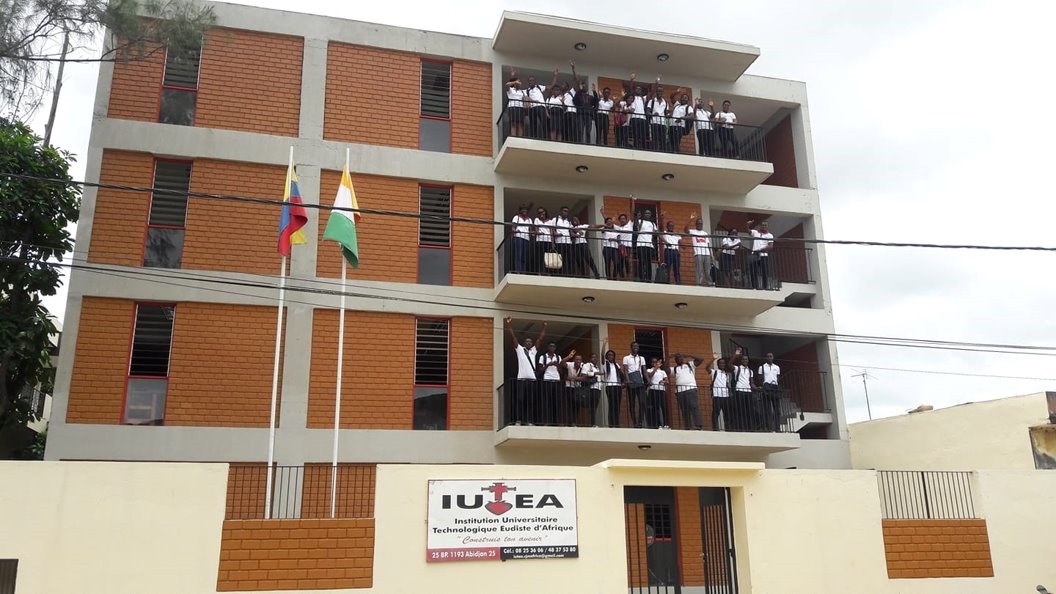
IUTEA students on the first own location of the institution in Youpougón- Abidjan, Ivory Coast.
PHOTO CREDITS: UNIMINUTO
Experience Impact
Impact in Colombia
The challenge of “alliances and internationalization” of the UNIMINUTO Development Plan, established as an objective the UNIMINUTO Model for other developing countries, but to be able to do so, it was necessary to have all of the organizational knowledge transferred in a gradual way, given the complexity of a big entity with 120,000 students, 5,000 teachers, and 3,000 collaborators, distributed in 70 attention points along the country, between the campus and main locations, regional centers, and tutoring centers. The first impact of the experience was precisely the model systematization, as the collective construction of knowledge which produced as a result the Manual of Modular System UNIMINUTO, that obtained registration of intellectual property and copyright with the number 10-566-362 by the Ministry of Interior of Colombia on March 16, 2016, as an unpublished work in the scientific technical field.
The impact in Colombia, through the participation of the government, allowed an alliance between the University and government, to export national knowledge, that thanks to the higher education politics, is consolidated as a university of social character of UNIMINUTO, and which strengthens the “offer” of international cooperation of Colombia to other countries with equal conditions. The experience and its results were well-known as an “emblematic project of cooperation offer” as part of the APC-Colombia (2018).
Ivory Coast Impact
The relationship with the governmental office that knew and accompanied the project, allowed a different proposal of cooperation to be shown, on higher education there are experiences on north-south cooperation in Ivory Coast, as the International University of Gran-Bassam, with the United States’ support, but orientated to the training of the Ivorian elites. However, given the costs of education, while the IUTEA experience missionally orientated to the base of the economic pyramid, the opportunities the University is looking for to approach communities of younger populations with scarce resources to access to higher education.
For this purpose, the Ivory Coast government, through its program of “orientated students” sent young people to the private HEI covering as part of the education costs and scholarship, it will initiate this year the submission of the orientated students to the IUTEA, preferably those of the Yopougon commune, which allows the program to be accessible through decreasing hidden costs, such as transportation, displacement, and time which implies studying at the HEI focused on the Cocody commune of Abidjan.
Finally, the impact on every youth who enters the IUTEA and their families is to see in higher education a “possible dream” with quality education and low cost, with appropriate programs to local development with comprehensive training, faithful to our value promise, which determines the Comprehensive Development as “the promotion of all me and the transition, for each and every one, from less human living conditions, to more humane conditions (Pablo VI, Encíclica Populorum Progressio, 1967, N° 14 y 20).
International Impact
Furthermore, in regards to international visibility which shares the organizational learning, and personal and professional experiences of those who participated, the presentation of the project, process, and its results on different stages of international events, allows the previous valuation and the publication of our experience. In September 2018, the Office of South-South Cooperation of the United Nations in the book of “good practices” of south-south and triangular cooperation, in the category of Education of Quality, there were about 10 experiences selected at a world level, and their contributions to the achievement of the Sustainable Development Goals (SDG) can be viewed: www.unsouthsouth.org/2018/11/28/
Conclusion
- The experience of UNIMINUTO in Colombia, being the biggest higher education institution in the country, orientated to the base of the socioeconomic pyramid, makes the most of the public institution of the private HEI by its contribution to quality, coverage, and relevant politics in the different regions of the country.
- The International recognition of the UNIMINUTO model encouraged its systematization and transference to other developing countries, which represented an innovation and an institutional challenge, which implies the organizational knowledge management to be explicit in the tacit knowledge which lives in the people who work in the institution in the different processes.
- The south-south cooperation became an innovative tool to share knowledge and experiences in a good practice way, which contributes to solving common problems.
- The transference of the UNIMINUTO model to CJM-Africa in Ivory Coast means an innovation of the improvement in the quality of life that people, families, communities, and territories live through education. Especially, within countries where the international cooperation traditionally focused on basic sanitation, health, infrastructure, literacy, and basic and secondary education.
- In the southern globe their own experiences and innovating solutions that contribute in an effective way to improve the quality of life of human beings, is a way to incentivize, promote, and sponsor social projects between developing countries. It is the appropriate way to put and share human, technologic, and economic resources to those in poverty by overcoming beyond development and post-development to achieve a vision of super development, understood as a higher development, based on the balance and environmental protection, guaranteeing the development of all living beings on the planet through a planetary interdependence scheme.
Works Cited
Agencia Presidencial de Cooperación Internacional de Colombia- APC. (2019). APC- Colombia. Obtenido de Glosario (En línea): www.apccolombia.gov.co/seccion/glosario
Agencia Presidencial para la Cooperación. (s.f.). Lineamientos para la Cooperación Sur - Sur en Colombia. Recuperado el 26 de junio de 2018, de www.mincit.gov.co/
Colciencias. (27 de junio de 2018). Colciencias. Obtenido de Transferencia de Conocimieno y Tecnología: www.colciencias.gov.co/portafolio/innovacion/
De Greiff, A. &. (2010). Elementos para la Construcción de Políticas en apropiación fuerte del conocimiento. Sin Apropiación no hay innovación.
Departamento Administrativo de Ciencia, Tecnología e Innovación- Colciencias. (2010). Estrategia Nacional de Apropiación Social de la Ciencia, la tecnología y la Innnovación. Grupo de Apropiación Social del Conocimiento.
Naciones Unidas. (1995). Estado de la Cooperación Sur- Sur. Informe del Secretario General en el marco del programa" Actividades operacionales para el desarollo: cooperación económica y técnica entre países en desarrollo. Asamblea General- Quincuagésimo período de Sesiones.
Organización de las Naciones Unidas para la Alimentación y la Agricultura- FAO. (2013). Buenas prácticas en la FAO: Sistematización de Experiencias para el aprendizaje continuo.
Pablo VI. (1967). Encílica Populorum Progressio. 14 y 20.
UNIMINUTO. (2015). El Sistema Modular UNIMINUTO- Resumen Ejecutivo. Bogotá D.C.
UNIMINUTO. (2016). Sistema Integral UNIMINUTO. Bogotá D.C.
Author bios
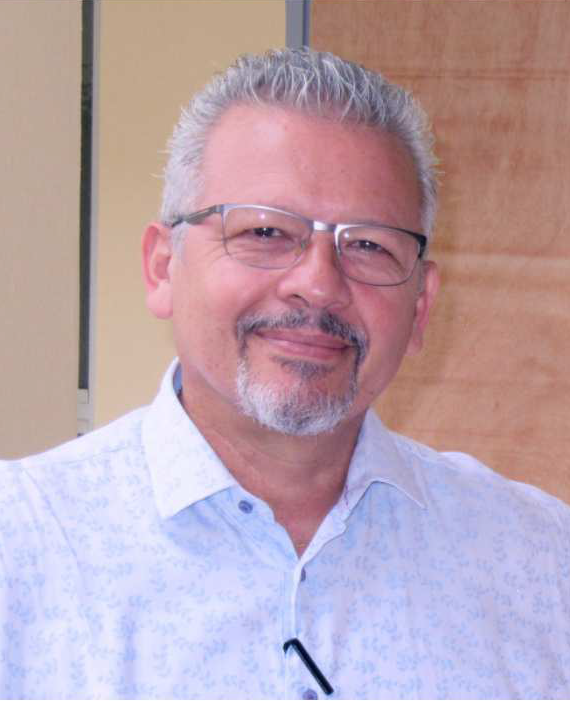
Jorge Enrique Gallego Vasquez is a doctor in pedagogic sciences, specialist in project management, engineer, and technologist on systems. He holds a master’s degree in peace, development, and citizenship from UNIMINUTO. Jorge serves as a teacher of degree projects in the Master’s in Education at UNIMINUTO, manager of UNIMINUTO International, and is co-director of the IUTEA in Ivory Coast, representing UNIMINUTO.
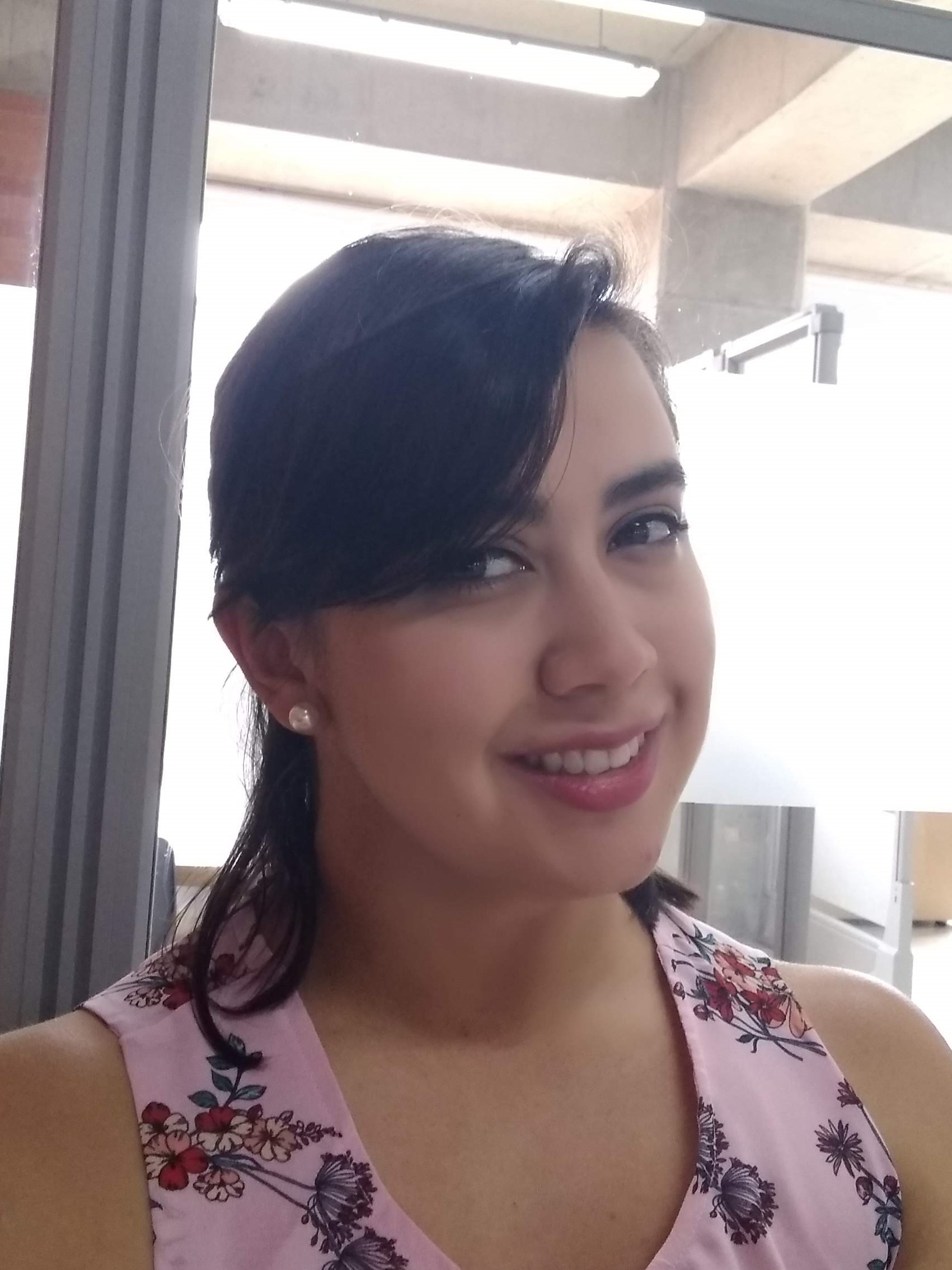
Ana Maria Cifuentes Camacho is a professional in international business at the Fundación Universitaria Empresarial de la Cámara de Comercio de Bogotá (UNIEMPRESARIAL). She holds a degree in Management Abilities and is an analyst at UNIMINUTO Internacional of UNIMINUTO.


